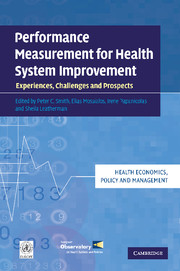Book contents
- Frontmatter
- Contents
- Foreword
- Acknowledgements
- List of contributors
- List of boxes, figures and tables
- Part I Principles of performance measurement
- Part II Dimensions of performance
- Part III Analytical methodology for performance measurement
- 3.1 Risk adjustment for performance measurement
- 3.2 Clinical surveillance and patient safety
- 3.3 Attribution and causality in health-care performance measurement
- 3.4 Using composite indicators to measure performance in health care
- Part IV Performance measurement in specific domains
- Part V Health policy and performance measurement
- Part VI Conclusions
- Index
3.3 - Attribution and causality in health-care performance measurement
Published online by Cambridge University Press: 06 July 2010
- Frontmatter
- Contents
- Foreword
- Acknowledgements
- List of contributors
- List of boxes, figures and tables
- Part I Principles of performance measurement
- Part II Dimensions of performance
- Part III Analytical methodology for performance measurement
- 3.1 Risk adjustment for performance measurement
- 3.2 Clinical surveillance and patient safety
- 3.3 Attribution and causality in health-care performance measurement
- 3.4 Using composite indicators to measure performance in health care
- Part IV Performance measurement in specific domains
- Part V Health policy and performance measurement
- Part VI Conclusions
- Index
Summary
Introduction
The important issue is that a good-quality indicator should define care that is attributable and within the control of the person who is delivering the care.
(Marshall et al. 2002)A desirable health-care performance measure is one that reliably and accurately reflects the quality of care provided by individuals, teams and organizations (Pringle et al. 2002). The means of attributing causality for observed outcomes, or responsibility for departures from accepted standards of care, is critical for continuous improvement in service delivery. When quality measures do not reflect the quality of care provided then accountability for deficiencies is directed unfairly and improvement interventions are targeted inappropriately. It is both unethical and counterproductive to penalize individuals, teams or organizations for outcomes or processes outside their control.
In addressing attribution in health-care performance measurement, assessors must first face their own imperfections – specifically the likelihood that fundamental attribution error may influence quality assessments. Identified through social psychology research, fundamental attribution error occurs as a result of inherent human bias that arises when viewing another person's actions (Kelley 1967; Ross 1977). Specifically, causality is attributed to their behaviour by overemphasizing an individual's disposition and under-emphasizing situational factors. This bias reflects a widespread cultural norm focusing on individual responsibility and free will that is reinforced by some legal frameworks.
When medical errors occur, it may be easier to recognize the active error that transpires rather than the multiple system-level errors that underlie it (Reason 2000). These latent errors may be more subtle and therefore more difficult to uncover and understand, especially in complex health-care environments.
- Type
- Chapter
- Information
- Performance Measurement for Health System ImprovementExperiences, Challenges and Prospects, pp. 311 - 338Publisher: Cambridge University PressPrint publication year: 2010



